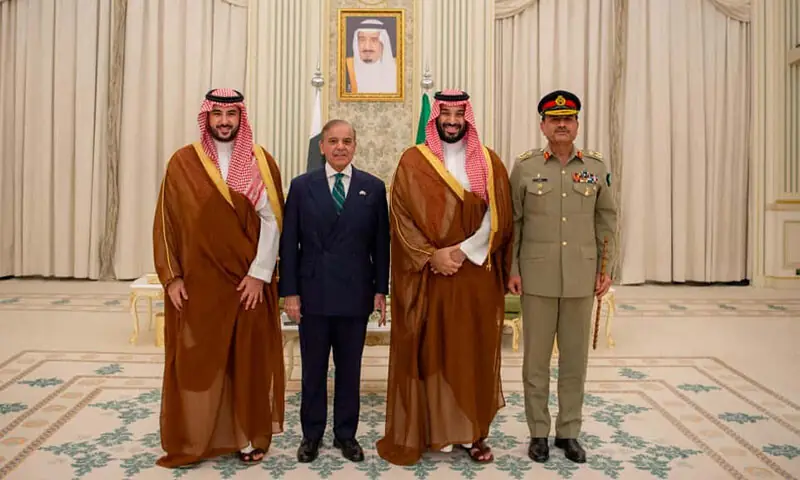
Pakistan and Saudi Arabia have taken a historic step in their decades long relationship by signing a Strategic Mutual Defence Agreement that formally commits the two countries to defend each other against external threats. The agreement, signed in Riyadh on September 17, 2025, during Prime Minister Shahbaz Sharif’s state visit, marks the most significant upgrade in bilateral ties in half a century.
At the heart of the pact is a clear clause: any aggression against one state will be treated as an attack on both. For two nations that have quietly cooperated in security matters for decades, the agreement transforms an informal partnership into a treaty-backed alliance with global implications.
From Informal Cooperation to a Formal Pact
Pakistan’s military presence in Saudi Arabia dates back to the 1960s, when Islamabad began sending trainers and advisors to the kingdom. Over the years, more than 8,000 Saudi officers have trained under Pakistani supervision, and Pakistani troops have been deployed in the kingdom during times of tension. Until now, however, this relationship had never been codified into a binding arrangement.
“This is the biggest upgrade in defense ties in fifty years,” a senior Pakistani defense official said after the signing. “It makes official what both sides always understood but had never written down.”The agreement establishes mechanisms for joint planning, intelligence sharing, and coordinated responses to potential aggression. It also signals to regional rivals that both countries are prepared to act collectively in the face of security challenges.
Why Pakistan Stands to Gain
For Islamabad, the pact arrives at a time of economic uncertainty. Facing debt pressures and repeated bailouts, Pakistan has leaned heavily on Saudi Arabia for financial support through oil on deferred payments, soft loans, and direct cash infusions. By linking its security cooperation more closely with Riyadh, Pakistan has effectively tied its economic and strategic future to one of the wealthiest nations in the Middle East.
The defense pact also boosts Pakistan’s diplomatic standing. Being recognized as Saudi Arabia’s formal defense partner allows Islamabad to present itself not only as a regional power but also as a central player in Middle Eastern security.
Saudi Arabia’s Strategic Calculus
For Riyadh, the agreement reflects shifting geopolitical winds. The kingdom has long depended on the United States as its security guarantor, but growing doubts about Washington’s long-term commitment to the region have pushed Saudi leaders to diversify their defense partnerships.
Pakistan is a natural fit: it is the only Muslim-majority nation with nuclear weapons and commands one of the largest armies in the Islamic world. Although the agreement does not explicitly mention nuclear cooperation, carefully worded comments from both governments have fueled speculation. A senior Saudi official told Reuters the deal covers “all military means,” while Pakistan’s Defense Minister Khawaja Asif noted that “whatever we have, our capabilities, will absolutely be available” to Riyadh.
Whether or not that implies a nuclear umbrella, the message is clear: Saudi Arabia now has a strategic partner beyond Washington.
Regional Reactions and Risks
The pact has triggered mixed reactions across the region. India, Pakistan’s long-standing rival, is quietly assessing what the alliance could mean for South Asia. While Saudi Arabia maintains close trade and energy ties with New Delhi, this agreement could complicate Riyadh’s efforts to remain neutral if another Indo-Pakistani crisis emerges.
The deal also comes at a tense time in the Middle East. Recent Israeli strikes in Doha and continued volatility in Gaza and Yemen have heightened concerns about wider conflict. By publicly aligning with Pakistan, Saudi Arabia is signaling to adversaries be it Iran, Israel, or non-state actors that it is not standing alone.
Yet analysts caution that the pact may serve more as a political signal than an automatic war guarantee. Pakistan has previously resisted Saudi requests to join its coalition in Yemen, citing domestic and regional sensitivities. Whether Islamabad would be willing to send troops or extend full military support in a future confrontation remains uncertain.
The Road Ahead
Despite unanswered questions, the defense agreement stands as a milestone in Muslim world diplomacy. For Pakistan, it offers not just economic reassurance but also a strategic partnership that strengthens its global profile. For Saudi Arabia, it provides a credible ally as it recalibrates its reliance on the United States and positions itself for a more independent security role.
“The agreement is less about preparing for war and more about deterring it,” said Dr. Hina Malik, a South Asia analyst at the Middle East Institute. “By putting their partnership on paper, Riyadh and Islamabad are sending a message that aggression against one will not go unanswered.”
As with many defense treaties, the true test will come not in peacetime statements but in the crises that lie ahead. Until then, the pact underscores a reality long visible in practice: Pakistan and Saudi Arabia see their futures as closely tied, both economically and strategically, in an increasingly uncertain world.

